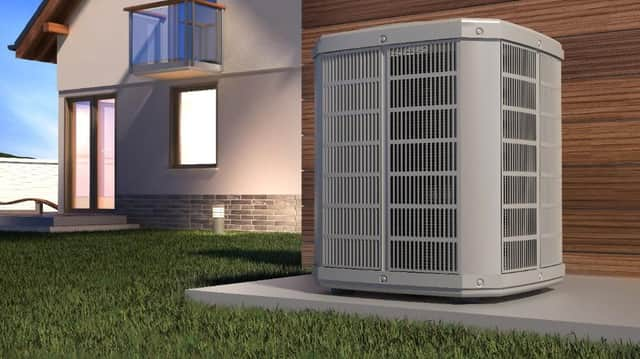What is a heat pump? Air and ground source heating system explained - and how government can help with the cost


In just three years time, new houses will not be permitted to have gas boilers installed and will need heat pumps instead.
That is because the UK Government has vowed to cut carbon emissions by 68%, compared to 1990 levels, by 2030.
Advertisement
Hide AdAdvertisement
Hide AdPart of Boris Johnson’s £12 billion plan for a “green industrial revolution” includes renewable energy in homes.
And if people replace their current gas boilers with a heat pump, the government could pay them under its financial incentives, the Domestic Renewable Heat Incentive (RHI) and the green homes grant.
The Scottish Government also recently announced a new £4.5 million cashback incentive to help people install renewable and energy efficiency measures in their homes.
So, what are heat pumps, and how could you receive money from the government for installing one?
What are heat pumps?
There are two types of heat pumps - ground source or air source.
Heat pumps work like a reverse air conditioning system, by absorbing heat from the ground or outside air.
This heat can then be used to warm radiators, underfloor heating systems and hot water in your home, without emitting carbon.
Heat pumps can still extract heat from the air when it’s cold outside, and work well in Nordic countries, where they are common, even when the weather is freezing - although they do use more energy in cold temperatures.
Advertisement
Hide AdAdvertisement
Hide AdInstalling a heat pump could lower your home’s carbon emissions, while also saving money on fuel bills, especially if you are making the change from another fuel source.
And because they are installed outside, a heat pump could free up space inside your house where your current boiler is.
However, most air source heat pumps will only heat a standard radiator to between 40 and 45C, compared with 60 to 80C using a gas boiler.
This means houses may need larger radiators to ensure their rooms can be heated at the same levels.
Heat pumps also can’t heat a home at the same speed as a gas boiler.
The air pumps are mostly made by Japanese air conditioner manufacturers such as Daikin and Mitsubishi. The latter produces air conditioning and heat pump equipment at its facilities in Livingston.
How much do heat pumps cost?
The government won’t force existing householders to replace their gas boilers, but if yours is needing replaced then experts advise installing a heat pump instead.
If you were to replace your existing heating system with a ground source heat pump, it could cost around £20,000 due to extensive digging, which can also cause disruption.
Advertisement
Hide AdAdvertisement
Hide AdAir pumps are cheaper, but still cost a lot more than a gas boiler. They can cost around £4,000 to £6,000 for the unit, and then thousands more to install.
Additionally, if you need to replace or expand your radiators, you will have to pay more.
However, under government financial incentives you will be given money to install one which could offset much of the cost.
How much could I be paid to install a heat pump?
Through both the green homes grant and the RHI scheme, and given that your energy bills will be reduced by installing a heat pump, you could end up saving thousands of pounds.
The government introduced the green homes grant in September, which encourages homeowners and landlords to apply for a voucher towards the cost of installing energy-efficient improvements in your home.
That includes installing low-carbon heating, like heat pumps, to lower the amount of carbon your home produces.
The vouchers are worth up to £5,000 against the installation of a new heat pump, or up to £10,000 if you are on a low income.
And under the Domestic Renewable Heat Incentive (Domestic RHI), people who join the scheme by switching to a renewable heating system will receive quarterly payments for seven years for the amount of clean, green renewable heat it’s estimated their system produces.
Advertisement
Hide AdAdvertisement
Hide AdIt could add up to thousands of pounds over the seven year period, depending on different factors.
To find out how much you could be paid, use the government’s RHI calculator.
The Domestic Renewable Heat Incentive (RHI) can be claimed in conjunction with the Green Homes Grant but the grant voucher must be claimed first, and the homeowner must then notify Ofgem it has been used.
In Scotland, a new £4.5 million cashback incentive to help people install renewable and energy efficiency measures in their homes was announced by the government in November 2020.
Homeowners will now be able to apply for 75% cashback up to the value of £7,500 towards the cost of a renewable heating system, like a heat pump, and a further 40% cashback of up to £6,000 for energy efficiency measures.
